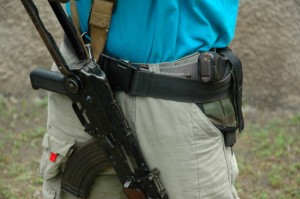By Michael Sale
My introduction to the sovereign citizen movement actually took place in Montreal in 2011 when American Military University (AMU) was exhibiting at an emergency management conference hosted, in part, by the Canadian Association of Chiefs of Police. An intelligence officer from the Royal Canadian Mounted Police was sharing a training video that was circulating in the United States, featuring Chief Bob Paudert of the West Memphis, Arkansas, Police Department.
Chief Paudert lost two of his officers when they were shot and killed as a result of a routine vehicle stop involving a father-and-son team of committed sovereign citizens. Chief Paudert’s son was one of those officers and as a result, Chief Paudert, who is now retired, has dedicated his life to educating police officers about the potential threat posed by sovereign citizens.

Initially, and incorrectly, I assumed this phenomenon was related to the United States only and that much of the focus was on the U.S. federal government, the Constitution and taxes. That was my understanding until I was in Ottawa for a meeting of the Ontario Association of Chiefs of Police. I received a briefing from an Ottawa Police expert about the “freemen on the land,” which is Canada’s equivalent to sovereign citizens. It seems very clear to me now that the freemen in Canada are operating in a way that is merely an extension of the movement south of the border.
It must have been because I was in Ottawa when I heard stories about freemen encounters by police that I assumed Eastern Ontario was the area where most of these people were operating.
Wrong again.
More recently, a national news story has emerged detailing the activities, and challenges, associated with active freemen in British Columbia, a well-populated province with a long history of interaction with the State of Washington. Once again, the story of the freemen on the land made headlines and the new face of this group emerged as a man named Brian Alexander. For several days, Alexander was the focus of a deluge of media stories and interviews (like this one) where he was given ample opportunity to explain the freemen movement and its disagreements with government institutions.
One of their on-going techniques to confuse and confound police officers is to offer up their own “notarized” documents, in lieu of conventional government identification. This activity has attracted the attention of real notaries who believe they may be perceived as participating in, or supporting, the freemen movement. In British Columbia, the provincial law society launched its own information campaign to explain what freemen on the land really are and to distance their profession from them.
If one wishes to read an example of a way in which a sovereign citizen or freeman of the land can prolong and impair the usual course of justice, this transcript addresses the activities of Canada’s Brian Alexander.
Police officers across Ontario have recently benefitted from a new training video, courtesy of the Ontario Police Video Training Alliance and their patrons, the Ontario Police College, the Ontario and Canadian Associations of Chiefs of Police and the Ontario Association of Police Educators. This thoughtful presentation addresses the sovereign citizen/freemen on the land movement in a Canadian context while including important information that clarifies the U.S-based version.
Simply titled, “Freemen on the Land,” one of the video’s important messages deals with the issue of violence and the caution that police officers must take. While purists may argue that sovereign citizens and freemen on the land are attempting to peacefully alter and improve the relationship between people and government, experts are quick to point out that these groups attract people who are prone to committing acts of violence to advance a cause.
Every police officer needs to be fully informed and trained to respond to the unique challenges they may face when dealing with a sovereign citizen or freemen on the land.
Have you ever had an exchange with a sovereign citizen? Have you received training on this subject? Any advice or recommendations for other officers who may encounter a sovereign citizen or freeman on the land?
Comments are closed.